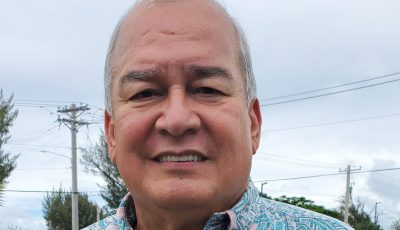Self-inflicted economic decline
About 14 years ago, major Japanese investments took an exodus that included withdrawing some $5-7 billion in money that used to be recycled here. Coupled by the closure of the $2.1-billion apparel industry our fiscal posture took a nosedive.
Their fade into the sunset was the result of weak-kneed elected officials ignorant of history while at a loss of the importance of policy stability on investments.
Then came the visit of Emperor Akihito. This was the most troubling in that he didn’t come to fix a fractured relationship but simply to put the final closure of Nippon investments.
The investment exodus created a vicious economic depression or persistent fiscal crisis we haven’t been able to fathom to date. So we had to endure dazed public officials while investors walked to jet ways not with their feet but luggage!
Did we do anything to stop the exodus or seek diplomatic intervention to urge Nippon investments to stay back? No! Thus the self-inflicted economic decline that consistently deepens by the day! Is there hope of reviving it? Or have we been laggard?
The dual shutter created monetary or an economic vacuum. Then we had to deal with precarious Sino-investments. There’s uncertainty gliding in trepidation what becomes of investments that rides largely on speculation based on stock sale. With the recent burst of China’s economic bubble, would it kill what is now a volatile investment here or would superficial cover prolong it a little more? Does this mean anything for the nimble minds on the hill?
Tourism: Today, tourism has dropped considerably from the loss of international flights and the shift in Japanese visitors heading elsewhere.
I waited in earnest to hear the trumpet of economic revival blaring from atop imperial Capital Hill. It seems muted or non-existent not to mention the vacuum of suspicion it has created. Strange the dementia that has metastasized among the elected elite unsure how the economy took a nosedive. Without decent understanding of this history is there a chance they could do anything of significance to shift paradigms?
The thematic redundancy of bankruptcy leaves heavy lack of trust in government. I’m not peddling political fiction. Ask the villagers for their sentiments upon which I’ve drawn my own viewpoint. Is paradise in trouble? You’ve created a vacuum of suspicion. The onus to resolve it is still on the side of the NMI’s court.
Retrospectively, I never had the illusion that it was easy. It’s a protracted system that takes years of policy refinement before we reach smooth sailing. I think it’s still called self-government!
Resetting Buttons: With mounting deficit while revenue generation simultaneously heads south we quiz what effects the dual fiscal drain would have on life in paradise.
The tattletale mission to Washington isn’t going to help the fiscal crisis here. And not for as long as the NMI doesn’t resolve to fix the self-inflicted fiscal mess or a fully thought-out plan to put its ducks in order.
Substantive questions would be asked of the NMI some of which would be heavily pointed and merciless. Those questions would put into perspective how well we understand the roles and functions of self-government. I’m sure we’d quickly learn that bankruptcy isn’t part of effective home rule nor is sleepwalking the realistic paradigm to employ to reset buttons.
Would Washington reward the NMI with a bailout given our profligacy? Aren’t our government accounts in tatters that stem from a bloated public sector, unaffordable pension promises, labor issues, the evacuation of some 3,000 of our own to the U.S. meaning far less by way of a tax base, and a tax system that is full of holes? With mounting debts, it’s sufficient a tectonic shift to derail paying for timely deliver of essential public services.
Furthermore, corruption metastasizing in affluenza is well known in Washington. It brings into focus nothing but humiliation in our adolescent perception of self-government. The lack of integrity of NMI investment policies is another aspect that requires full explanation specifically, how come it failed to spur additional investments via an even playing field? Did you ensure that soft counting in the casino is taxed a certain percent? If not, isn’t this a huge drain in revenues the NMI could collect and use for public services suffering from budgetary shortfall?
Begin with a Plan: Unless data is collected to show how much deficit we have in our books versus revenue collection only then would one have a clearer view of the real state of fiscal affairs here. With this on hand dedicated planning can begin what economic ventures are likely to spur economic growth. It requires meticulous planning moving from A, B, and C. We could retract when we reach “D” for policy refinement. Lest you forget lasting policy dictates everything! Either we humbly plan our future or watch the sturdy disintegration of the NMI.
Step into your future: Training and education are the only vehicles to bridging “job-vs-skills” of the local work force. Training in any vocational or technical area is the only opportunity to getting skills for certain jobs.
The trainee is taught how to do certain tasks at work. Upon getting the training under his belt, he’s prepared to begin working on his own. As he goes on and refines his skills it sets him up for promotions. It enables him to bring home more money for his individual or family needs.
There are other areas like information technology or the service industry where interested locals could apply for training and eventual fulltime employment.
Students now attending NMC are also preparing for a future. A good education should set them up for future careers. It’s a very healthy undertaking.
The key success factor however gradual is the building of a competent pool of vocational, technical and college graduates the demand of which would continue to rise. Like the journey of a thousand miles it begins with the first step. Do it and do it now!



























